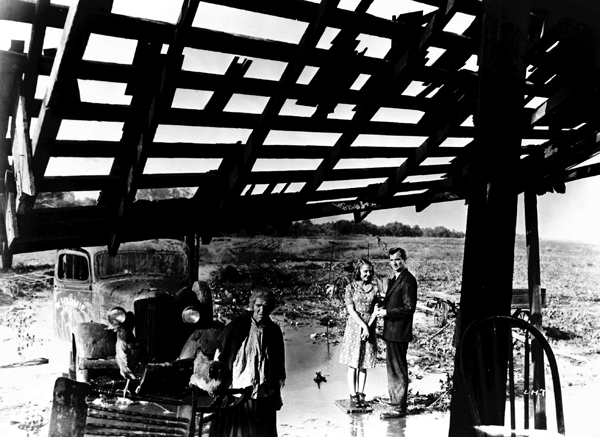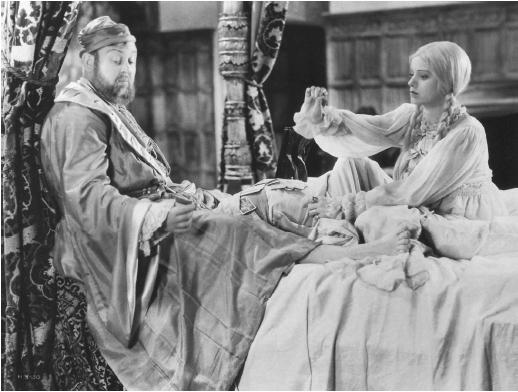The film I'm going to talk about today is the film for which Ladd is best remembered; the 1953 George Stevens Western, Shane. Ladd plays the titular hero, a gunslinger who has hung up his six-shooter, and just wants to live a peaceful life. It's an intriguing character, a man who is clearly trying to escape from something - probably a part of himself - and who seems to carry with him some terrible burden. It is also a character which seems both perfect for, and totally in contrast to, the actor. Ladd, you see, is a beautiful man; blonde hair, soft features, slight frame. As he himself put it: "I have the face of an aging choirboy, and the build of an undernourished featherweight." In appearance he seems totally unsuited to the role of a deadly Western hero. But, with his striking countenance comes a sensitivity which elevates Shane from those around him. It allows us to feel that he is something special, almost a mythical, angelic figure, whose pure-heartedness can win out over evil. It also conveys to us the necessary depth, which implies that Shane is leaving behind some great sorrow, even though it is never referenced in the film.
Ladd's beauty is matched by that of the Californian landscape, standing in for Alabama. There we meet the Starretts; Joe, wife Marian, and son, Joey. They, along with a small group of neighbouring homesteaders, are seeing their claims to their land questioned by a local rancher, Ryker, and his posse. The Ryker boys are becoming evermore aggressive in their attempts to run the homesteaders out, but Joe vows to stay put. The opening sequence of the film gives a little window into the way of life that Joe is defending; a fawn splashes about in the river while 9-year-old Joey takes aim with his rifle (not loaded), the hardworking Joe takes an axe to a troublesome tree-stump, while Marian prepares dinner inside. It's an idyll, with the aim to show us just what the stakes are. Moments later a lone horseman crosses the horizon, and approaches the farm. This is Shane, and it isn't long before he has all of the Starretts charmed. Heading North towards a new life, Shane is invited to work on the farm instead, and soon becomes a part of the family.
While the film's central premise is fairly standard Western fare (land dispute turns ugly), there is an abundance of subtext. For example, one of the more interesting elements at play is the way Shane's arrival disrupts the family dynamic. Most explicit is the idea that Joey hero-worships Shane. He scarcely has a line of dialogue throughout the film which doesn't pertain to Shane, begs Shane to teach him how to shoot, and even says to his mother at one point that he loves Shane almost as much as he loves his own father. Taking this further, Brandon De Wilde, who plays Joey, with his blonde hair and blue eyes, looks much more like Ladd than he does Van Heflin, who plays Joe.
The other relationship that the film impresses upon us, is that between Shane and Marian (Jean Arthur). It is made fairly clear from an early stage that Marian is quite taken by the newcomer, and, through his lingering glances towards her, we guess that he feels similarly. However, ther is never the sense that anything might happen between them. Marian loves, and is committed to, Joe, but there is almost a kind of pure love between Marian and Shane, something that even Joe picks up on. When he prepares himself for a final confrontation with Ryker, he intimates to Marian that he knows she will be looked after if he doesn't come back, perhaps even better than he can look after her. It is also fitting that one of the last lines of the film is Joey shouting to Shane as he heads off to new pastures "mother needs you. I know she does".
 |
| Ladd and Heflin: power couple. |
Like in any Western, masculinity is a key theme, and perhaps none more so than here. Shane's next task is to prove his masculinity to the rest of the town, something that won't be easy given his desire to leave behind his violent past. Early in the film he goes into town on an errand for Joe. At the general store he buys himself some nice clothes, and then stops in at the adjoining saloon to buy a soda-pop for Joey. The saloon is apparently the permanent residence of Ryker and his men, and, when they see this slight, blonde man, in nice new clothes ordering a soda-pop, they immediately have an invitation to make trouble for him. Because of his appearance, and the fact that he is buying a non-alcoholic drink, Shane is presented as being 'not a man', or a sissy. The film doesn't say it, of course, but the implication is that Shane is, in the eyes of Ryker's men, "a queer". One man, in particular, Chris (Ben Johnson), makes things difficult for Shane, throwing a drink at him so he can "smell like a real man", and telling him that he doesn't belong there. Shane, probably because he doesn't want to re-visit his past, takes the high ground and leaves, but, this being a Western, that only leaves himself open to more questioning of his masculinity.
Later, after all the homesteaders decide to go to town together (strength in numbers), Shane decides that he needs to confront those that have humiliated him, and cast him in a bad light to the rest of the townsfolk. He goes back to the saloon, where he is told that he would be better off next door with the women and children. This time, though, instead of turning the other cheek, Shane proves his manhood by returning the favour of throwing a drink at Chris, and then knocking him on his ass. This act starts one of those good old-fashioned barroom brawls (complete with chairs being cracked on people's backs!), in which Shane is strongly outnumbered until Joe comes in to fight alongside his man.
Now that Shane's true prowess is known, Ryker must up the ante, and he does so by bringing in an outsider of his own, the feared gunslinger, Jack Wilson. Wilson is played in suitably dead-eyed manner by noted character actor, Jack Palance, whose dark hair and impossibly sharp cheekbones put him in perfect contrast to Shane. It is an interesting twist on the tale that, in a film where the central conflict is about rights to property, it should be settled between two men who have no stake and nothing to lose.
Joe himself, makes the decision to face Wilson and Ryker at the saloon, after several of the other homesteaders have already resolved to leave town. Marian begs him not to go, but he is insistent, even when Shane emerges out of the shadows, wearing the six-shooter that had been conspicuously absent throughout the film. This leads to a confrontation between Joe and Shane, with both men determining that they should be the one to go. Marian, who of course, loves both, is in hysterics. The dispute ends the only way it can, with the two men fighting out in the yard, both trying to knock the other senseless so that he can go to die in his place. If that ain't love, what is?
 |
| Palance: the man in black. |
Ladd's performance is iconic, but it was not Oscar-nominated. In fairness, the best actor category that year was stacked (Brando, Burton, Clift, Lancaster, eventual winner Holden- I mean, come on). Both the 11-year-old De Wilde, and Palance, were nominated in the best supporting actor category though, losing out to Frank Sinatra's turn in From Here To Eternity (which dominated that year, and rightfully so; it's wonderful). De Wilde is an interesting story himself- dead at 30 after an automobile accident, and immortalised in a song by his good friend, country music icon, Gram Parsons. This is actually a film full of great performances, but De Wilde's is actually one I wasn't keen on. The other would be Jean Arthur's turn as Marian. I found both to be rather too one-note in their doe-eyed infatuation with the hero. Van Heflin is strong as Joe, a man with an interesting face that makes him sympathetic as a cuckold, but also believable as a man of strength and determination. Palance is also very good.
George Stevens picked up a best director nomination, and it was thoroughly deserved. This is surely one of the most beautiful of all Westerns, but he also imbues the story with intelligence and sensitivity, and gives depth of meaning to every shot. A best picture nomination was also awarded to the film (Stevens also produced).
I tend to like my Westerns more Sam Peckinpah than John Ford. That is, I like Peckinpah's take on the Western as a dying genre, and the American West as a battleground for old men with outdated values. This is more a Ford-style celebration of Western values, but it's also one of the best Westerns I've ever seen. This is a film so rich in subtext. Even if you ignore the homoeroticism, which I saw in the film, there are still elements like the changing family dynamic, and the very real notions of masculinity to provoke though and raise questions. This, along with themes of loyalty, friendship, and what it means to have a home, make this one of the most interesting American films of the 1950s. It also has bar fights and shoot outs, if that's more your cup of tea. In short, this is a 5 star film.
Next time out I'll have a brand, spanking new review for you. Until then, here's looking at you!


%20DVD%20Review/Southerner_Poster.jpg)












